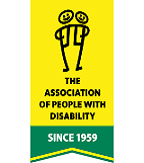Quis autem velum iure reprehe nderit. Lorem ipsum dolor sit nulla or narjusto laoreet onse ctetur adipisci.
Association of People with Disabilities (APD)
Supported by: Wipro Cares
About APD
APD was founded as an NGO in Karnataka in 1959, working for equality, dignity, and justice for People with Disabilities (PWD). It was founded by a visionary polio-afflicted woman, Late Ms. N. S. Hema, whose aim was to empower persons with disability to become active, contributing members of society.
APD Programs
Early Intervention (EI), Inclusive Education (IE), Livelihood, Spinal Cord Injury Rehabilitation Program (SCIR), Rehabilitation & Disability (PT, OT, SLT and AAT unit), Community Mental Health Program (CMHP), Institute of Disability for Rehabilitation and Research (IDRR), Collaboration program comprising of District Management, Government Interface and Policy Advocacy. The services are delivered through the institutions: Center-based, Camp-based, NGO partners, and Home-based.
Based in Bengaluru, Karnataka, the above programs are implemented through projects in rural and urban Karnataka; to enable, equip, and empower children and adults with a range of disabilities including locomotor, spinal cord injury, speech and hearing, cerebral palsy, and to some extent, mental issues. Till date, we have impacted 5,69,000 lives of people with disability.
The Approach
APD’s life cycle approach to PwDs is fairly unique. APD provides multiple services to PwDs based on the type, degree of disability, and program-specific outcomes through the Institution based Rehabilitation Model (IBR) and Community Based Rehabilitation Model (CBR) approach. All beneficiaries and caregivers receive training, rehabilitation, and therapy from a multi-disciplinary team as well as prosthetic aids and mobility aids, custom-made in an in-house workshop. APD’s teams work directly, and through an array of service providers and the government, to provide appropriate services for urban, semi-urban, and rural beneficiaries. APD is focused on building an ecosystem by enhancing the capacities of NGO partners, government officials, caregivers, and other stakeholders.
The LCA project can be categorized into two models – (i) LCA Core Model integrate projects comprising of Early Intervention, Inclusive Education and Livelihood (ii) LCA continuum Model – this model comprising of integrated projects of Community Mental Health Project, Spinal Cord Injury Rehabilitation Program (SCIR) attempts to intervene and bring PwDs on the LCA path to ensure rehabilitation and provide an opportunity to reclaim and access livelihood opportunities. This ensures social inclusion and integration.
APD are guided by the E3 philosophy of “Enable, Equip, Empower” – enabling PwDs to acquire knowledge, information, and perspectives; equipping them with skills to enhance functional abilities and mental well-being; and empowering them to access their entitlements.
Locations
In the year 2020-21, APD served 50,000 beneficiaries in the disability ecosystem in Bangalore, Gulbarga, and Belagavi divisions of Karnataka. The projects are implemented directly or in collaboration with NGO partners and government agencies. The major projects of the program are located in Bangalore, Kolar, Davanagere, Haveri, Bagalkote, Belagavi, Mangalore, Koppal, and Gulbarga districts. The Livelihood program mobilizes candidates from all 31 districts of Karnataka and Ananthpur district of Andhra Pradesh. The policy and advocacy campaigns cover all the 31 districts of Karnataka and through the District Law Unit, projects covers all the South Indian States.
Plan for Next 1-3 Years
APD Plans to implement the Life Cycle Approach from Program level to the Project level. These project models, essentially, adapt Life Cycle Approach (LCA), which guarantees age group-centric services to those specified PwD groups, to drive through path of improvement to achieve their domain objectives within the set timelines, contributing to the positive outcomes. The Life Cycle Approach is also the convergence of all APD programs in a chosen geography, to mobilize the combined strength of projects to deliver services through a well-designed rehabilitation hub known as District Rehabilitation Center (DRC). LCA approach is also a cost-effective way of implementing projects as compared to the standalone projects.
LCA projects are planned in Bagalkote and Chitradurga districts. The Livelihood Program through its Rural Employers Led Training (RELT) is set to expand its operations into Tamil Nadu, Andhra Pradesh and Telangana. The program of these states will be implemented through local NGO partners, Training Partners through various delivery models – (i) Recognized Priority Learning and (ii) Day Scholar Method.

